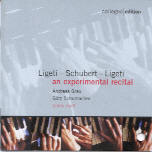An experimental recital, reads the provocative title. The “experiment” is this: The Grau-Schumacher duo program Gyorgy Ligeti’s Three Pieces for Two Pianos not in successive order, but interspersed with two large-scale Schubert four-hand works. While the juxtaposition is interesting, in truth it doesn’t work. First of all, you lose the contrast and momentum Ligeti intends through his cyclical ordering. Secondly, Ligeti’s concentrated style requires a listening frame of mind different from Schubert’s leisurely discourse. What of the performances? Col Legno’s detailed sonics have a depth that’s missing from Pierre-Laurent Aimard and Irina Kataeva’s more refined interpretation for Sony’s Complete Ligeti Edition. Grau-Schumacher’s fussy phrasing at the Schubert Fantasy’s outset yields to the more fluent Perahia/Lupu (Sony) or Piano Duo Schnabel (Town Hall) versions. The German duo fares much better in the Sonata in B-flat (D. 617). My reservations vis-à-vis the aforementioned programming experiment, of course, can be solved at the flick of a CD remote-control programmer.
































